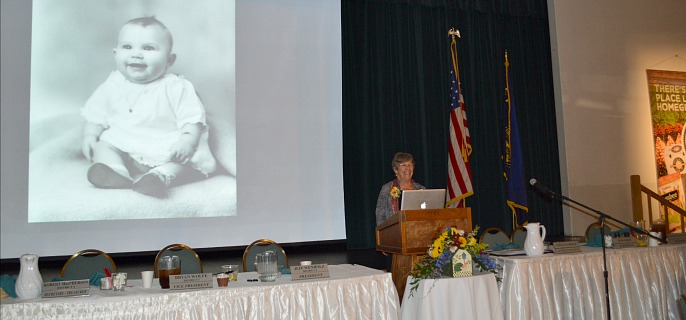
With the theme of “Homegrown,” Judy Hill Lovins could not have been a more perfect choice as guest speaker at the 78th annual meeting of Umatilla Electric Cooperative members on Saturday night. After all, the world-renowned photographer grew up right here in Hermiston.
Hill entertained the capacity crowd with photos and stories of growing up in Hermiston, going off to become a hippy in Haight Ashbury, opening a world class art gallery and Aspen, Colo., and traveling the world with her husband, Amory Hill, co-founder of the Rocky Mountain Institute.
And it all started in Hermiston. Hill, the daughter of Harold and Irene Miller, traveled all over the Northwest during her childhood as her father pursued hydroelectric jobs before settling in Hermiston.
“Eastern Oregon is a great place to grow up,” she said, even though in the early days, her family had no indoor plumbing and had to use an outhouse.
“I still don’t remember where we bathed,” she said. Her mother, Irene, who was in the audience Saturday night, was very involved in her children’s lives, leading Bluebird and Campfire Girl troops and 4-H programs.
In the 1950s, Hill experienced a terrible tragedy when she watched a friend, Patty Manny, fall off the Hermiston Butte to her death.
“I remember hearing a scream no 9-year-old should ever hear,” she recalled. “But somehow, we grow from such heartache.”
An excellent student, Hill nonetheless found herself in hot water two days before she was to give the Salutatorian address at her graduation. She and a friend skipped school to hang out at the river. Their tans the next day gave them away and HHS principal Jack Jenkins assigned them after-school chores. Things got worse when they wore jeans while doing the chores (a crime worse than skipping school in those days). They were sent home.
“I was the Salutatorian and here I was expelled!” It was only temporary, however, and in 1963, she went to OSU and studied business administration with a minor in clothing and textiles. She wanted to travel the world and thought she would become a buyer for a major department store. She moved to San Francisco in the Haight-Ashbury area during the height of the Summer of Love where she sold bras and girdles.
“I sold bras during the week and burned them on weekends,” she said. She went to work at Levi Strauss and became the first woman in its marketing training department. She soon decided the corporate world wasn’t for her and she moved to Colorado to become a “hippy ski bum” and worked in a cafeteria.
“Mom and Dad wondered why they sent me to college,” she said.
She went on to become a world-class photographer and fine artist and corporate art designer. She opened her first gallery in a travel trailer and started a custom frame shop out of a garage. Her gallery, Hill Gallery of Photography, gained widespread recognition with John Denver being “one of our star clients.”
Her dream of traveling the world eventually came to be when she married Amory Hill, a MacArthur ‘genius grant’ recipient and widely considered among the world’s leading authorities on energy, its efficient use and sustainable supply, and an innovator in integrative design and in superefficient buildings, factories and vehicles.
“Amory might be the only member of the National Petroleum Council that drives a car that uses no oil and that has a license plate that says ‘OFF OIL,’ ” she said.
Their 4,400-square-foot home is a showcase of green energy. Amory’s latest book, Reinventing Fire is lays out a plan to get the U.S. completely off oil by 2040.
During her marriage to Amory, they have traveled the world, visiting China, Japan, Borneo, Mexico, England, France, and Colombia. A few years ago, she traveled with Amory to Davos, Switzerland for the World Economic Forum. The panelists included international political, religious and business leaders talking about how to end poverty and lower the childhood mortality rate.
“Everyone was saying ‘We should do this’ and “We should do that,’ ” she said. “I raised my hand and said I would like them to change the tone from ‘We should’ to “I will.’ ”
She then showed the UEC members a YouTube clip of the forum, showcasing her question and how the panelists all began to talk about what each of them “will do” to improve conditions in the world for the poor and young.
And though her life turned out far different from her initial goal of being an international buyer for a major department store, she did end up accomplishing her goal of traveling the world.
“Our dreams often work out despite our best-laid plans,” she said.










